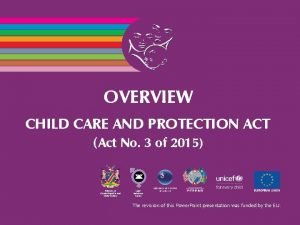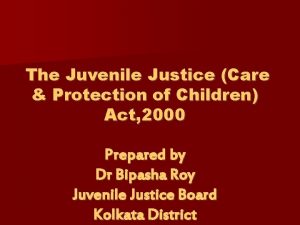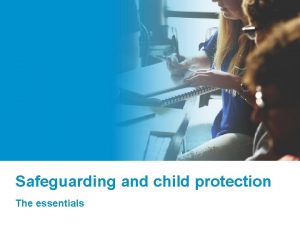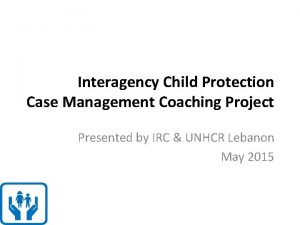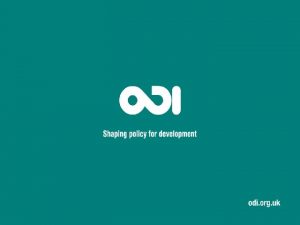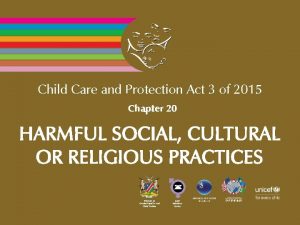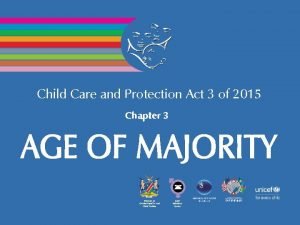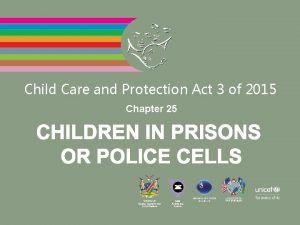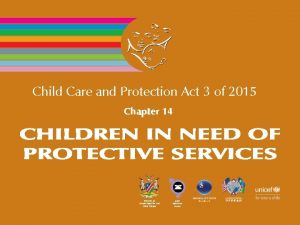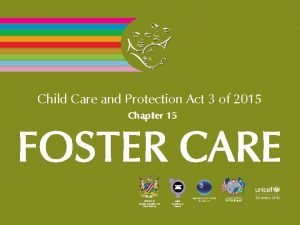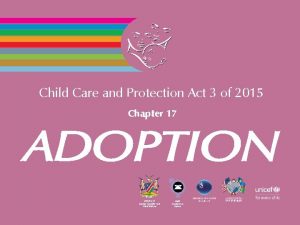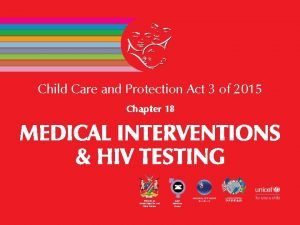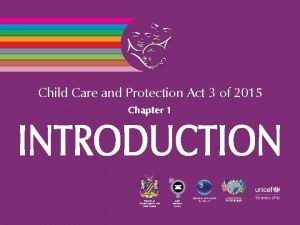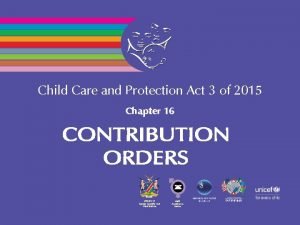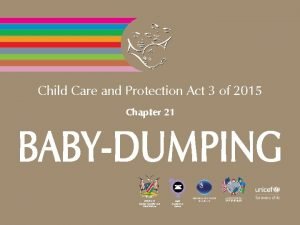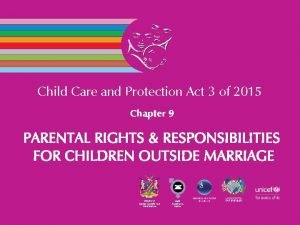Child Care and Protection Act 3 of 2015














- Slides: 14

Child Care and Protection Act 3 of 2015 Chapter 4 NATIONAL ADVISORY COUNCIL ON CHILDREN, CHILDREN’S ADVOCATE AND CHILDREN’S FUND Ministry of Gender Equality and Child Welfare Legal Assistance Centre

OVERVIEW The Child Care and Protection Act creates several new mechanisms for advancing child protection: National Advisory Council on Children: a multi-sectoral body called tasked to promote the rights and interests of children Children’s Advocate: an official in the Office of the Ombudsman who focuses on issues relating to children Children’s Fund: a special fund that pools resources from different ministries, donors and development partners for programmes which will benefit children.

1. National Advisory Council on Children The National Advisory Council on Children is a multi-sectoral, government-appointed bodywith the task of promoting the rights and interests of children.

Functions of Council To encourage cross-sectoral cooperation on matters relating to children To advise government on matters relating to protection and care of children To advise government agencies on how best to fulfil their functions under laws on children To advise on the need for law reform To encourage involvement of NGOs and communities To design and recommend programmes relating to prevention services or child protection To study, investigate and monitor implementation of all laws relating to children To perform other functions assigned by the Minister.


Procedures of the National Advisory Council Meetings: 2 x per year minimum Quorum: 8 out of 14 members Committees: established as needed Administration: provided by Ministry responsible for child welfare External advisors: can appoint any expert Expenses: from State Revenue Fund or Children’s Fund Access to information: right to access information from any government body as necessary to carry out functions Annual reports from ministries: all ministries that exercise functions affecting children must report to Council Annual report of council: report to Minister responsible for child welfare, who must table the report in Parliament

2. Children’s Advocate The Children’s Advocate is an official in the Office of the Ombudsman who focuses on issues relating to children.

To investigate complaints about services provided to children or violations of children’s rights Functions of the Children’s Advocate To monitor implementation of Convention on the Rights of the Child, African Charter on the Rights and Welfare of the Child & other international agreements To monitor implementation of CCPA & other laws pertaining to children To take cases to court as necessary to further interests of children To raise awareness about the CCPA and the importance of child protection in general

Powers of Children’s Advocate The Children’s Advocate has the powers set out in the Ombudsman Act: to enter premises (except private homes) and question any person present to access books, documents and other materials to request relevant information from any person to seize anything relevant to the investigation to subpoena persons to provide information under oath, or relevant documents to require anyone to cooperate with the investigation.

“National human rights institutions must have the right to report directly, independently and separately on the state of children’s rights to the public and to parliamentary bodies. In this respect, States parties must ensure that an annual debate is held in Parliament to provide parliamentarianswith an opportunity to discuss the work of the national human rights institution in respect of children’s rights and the State’s compliance with the Convention. ” Committee on the Rights of the Child, General Comment No. 2 (2002), paragraph 18 The Children’s Advocate is part of a national human rights institution (the Office of the Ombudsman). Namibia’s Parliament should be encouraged to implement this recommendation.

3. Children’s Fund The Children’s Fund is a special fund established to pool resources from different ministries, donors and development partners for children’s programmes.

Sources of funds Funds appropriated by Parliament Grants, donations or bequests received by the Council Income from investments Other moneys or assets accruing to the Council

Appointment of external advisors to the National Advisory Council on Children Activities of the National Advisory Council on Children & the Children’s Advocate Establishing, maintaining, or upgrading facilities for children & funding programmes at these facilities Training of persons who implement the CCPA Any other activities relating to implementation of the CCPA Uses of funds Early childhood development programmes Prevention and early intervention programmes

Administration of Children’s Fund Accounting officer: The Executive Director of the Ministry responsible for child welfare must administer the Children’s Fund, acting in concurrence with the Minister. Carrying funds across financial years: Any unspent balance in the Children’s Fund at the end of a financial year must be carried forward. This is one of the advantages of the Children’s Fund, since this kind of carry -over is not possible with normal government budgets. Audit: The Auditor-General must conduct an annual audit of the Children’s Fund and submit a copy of the audit report to the National Advisory Council on Children. ***
 Child care and protection act 3 of 2015
Child care and protection act 3 of 2015 Children's rights and responsibilities posters
Children's rights and responsibilities posters Child protection and toy safety act
Child protection and toy safety act Child protection reform amendment act 2017
Child protection reform amendment act 2017 Juvenile act
Juvenile act Data protection act in health and social care settings
Data protection act in health and social care settings Section 47 family law act
Section 47 family law act Safeguarding and child protection the essentials
Safeguarding and child protection the essentials Health care levels primary secondary tertiary
Health care levels primary secondary tertiary Courage child protection
Courage child protection Types of child protection
Types of child protection Types of child protection
Types of child protection Child protection case management tools
Child protection case management tools Types of child protection
Types of child protection Professional curiosity in nursing
Professional curiosity in nursing

